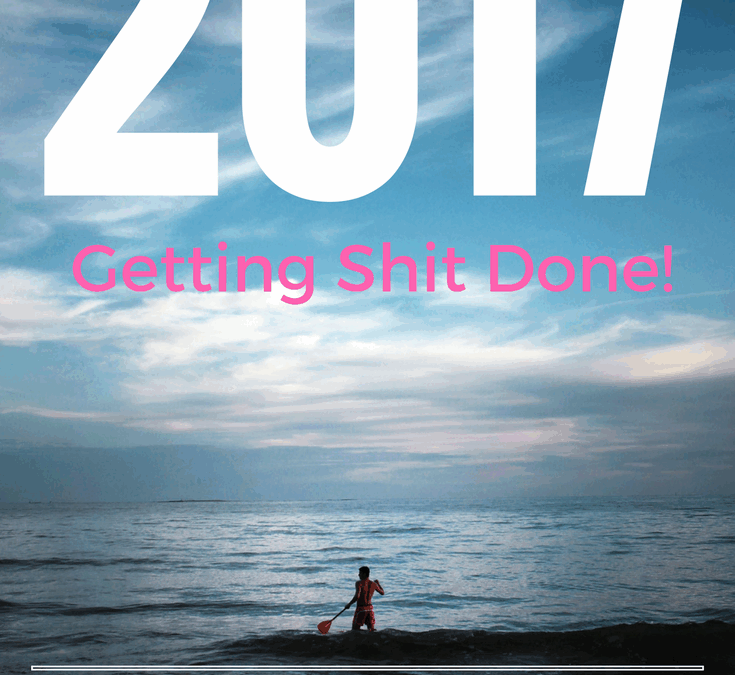
by Kasia | Jan 4, 2017 | Blogging, Business
Yesterday’s gone, tomorrow doesn’t exist and right now is all there is.
Yes, I’ve heard it too. But it doesn’t stop me from looking back over the past twelve months and thinking about what I want to do next year.
On a success scale of 1 to 10, where one is complete failure to ten being an epic success, I’d rate 2016 about a 6.

Am I being fair? I’m not sure. But here are just a few of the things I achieved.
✓ Started a new position with the same company at a higher pay
✓ Published Lethal Instincts – a prequel novella
✓ Published Lethal Aftershock – a sequel novella
✓ Drafted Lethal Games – book 4 in the Lexi Ryder series
✓ Ran the Mother’s Day Classic 8km
✓ Spent a week in Fiji
✓ Ran the Fiji 5km and came 3rd female (awesome!)
✓ Spent a week in Hawaii (epic!)
✓ Increased my social calendar activities by saying YES more often
✓ Started construction on the house (sort of)
✓ 15 Email Subscribers
✓ Sold 98 books
✓ Gave away over 1,596 books
But I don’t feel successful. I don’t even feel happy. It’s been an emotionally turbulent year and I’m working on getting all my ducks in a row. The most important is my family’s health and the rest will slowly fall into place.
Deep inside I’m feeling like a failure and that sucks big time.
I need to shift gears. Stop taking so much on and focus on the little things more.
In 2017, I don’t want to work harder. I want to work smarter. I also need to be grateful for the little things.
I’ve been meaning to write and publish this post for the past week. Call it laziness, call it procrastination, call it whatever you want but I haven’t been able to get motivated to do much writing at all lately.
Then it hit me: motivation isn’t going to come knocking on my door. I need to seek the motivation to keep me going forward with my dreams, with my goals, with the habits I’m chasing.
It’s up to me to make a change. Just the same as it’s up to you to create change, joy and excitement in your own life.
Imagine December 31st 2017, what are some of the goals you want to be ticking off your list? What’s important to you? How hard are you willing to work for what you want? Is 2017 going to be the year that you achieve your wildest dreams?
Do you find yourself setting the same goals each year?
Hmm, me too. I’ve noticed that my productivity wavers between the years. One year I’m all about hard work and achieving lots and then the next year is just a downer. It’s weird and frustrating and has to stop.
But I do have to learn to take it easy sometimes. Which is why this morning I spent two hours lying a blanket under a tree by the beach after dropping my son off at kindy then I treated myself to a nice lunch while I wrote and thought about what I want to achieve in 2017.
When you consider your goals you need to think about the following:
Do you really want it?
How hard are you willing to work for it?
What’s your plan for achieving them?
Are the goals difficult but realistic?
Can you break them down into bite-sized pieces?
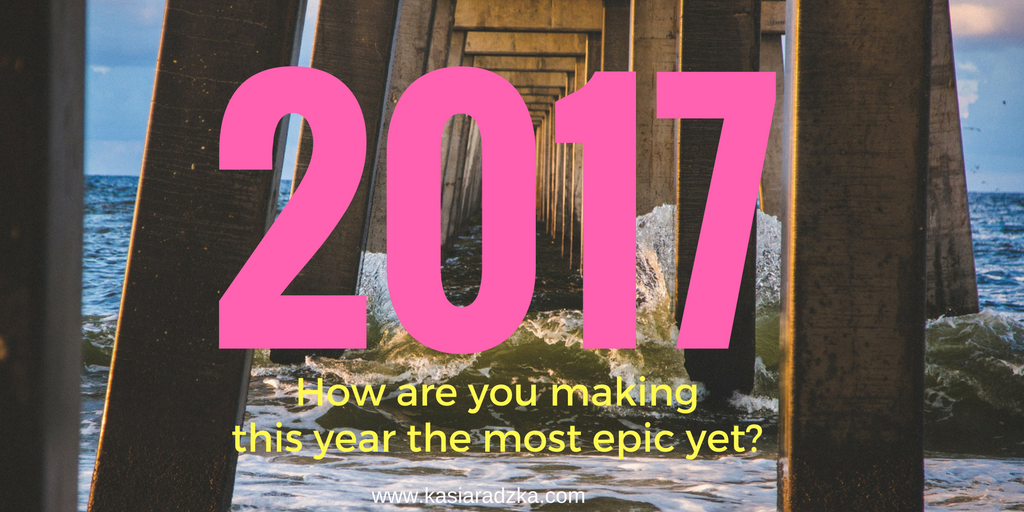
MY 2017 GOALS
1) Start and finish the construction of my house.
That should finally start mid January and hopefully be completed by August. Fingers crossed. All the finance and paperwork and contracts are organised so it’s just a matter of the builder getting started.
By 31 December 2017 I’m living in my newly built home with my husband and son, and I’ve done up an awesome home office full of inspiration for writing.
2) Write and publish three fiction books and one non-fiction book (that’s 4 books in 2017).
There are four quarters in the year so one book per quarter. I can write a book a month, then spend a month editing and the third month preparing for publication. Ok, I’m being super optimistic here!
By 31 December 2017 I have seven books on the market which are selling, getting positive reviews and bringing me at least $1000 in side income each month.
3) Complete the 70.3 Ironman in Ballarat in under 6 hours.
This race is in December. I’ve did a 70.3 before I had my son and I’d like to do it again but giving myself a year to prepare rather than just the five months I had previously. There will also be a few fun runs and a half marathon (maybe a full) somewhere in the middle – signing up for these events keeps me motivated to train.
By 31 December 2017 I’ve trained hard all year, injury-free, and am comfortably finishing the 70.3 in under 6 hours with the bike leg under 3.2 hrs and the run leg under 2 hrs with my family watching on the sidelines cheering me on.
4) Earn $25,000 from freelancing, blogging, books and side hustles.
That equates to $2500 per month. While this figure won’t allow me to quit my job and work for myself it will help me reduce my mortgage and give me funds to travel.
By 31 December 2017 I have two websites that are getting 15,000+ views per month and are earning me an income through affiliate marketing, sponsored posts and products sales.
5) Travel to three new places this year.
The places on my mind are New Zealand, Barossa Valley and Tasmania. Earning extra side income will help me achieve this. The places aren’t set in stone though, I’ll be looking for specials throughout the year.
By 31 December 2017 I have spent a weekend at the Barossa Valley in April, followed by a week in Tasmania in July, and a long weekend in October in New Zealand.
6) Increase my personal savings to $15,000+.
While the mortgage is priority, I’d like to have cash sitting on the side as a safety net.
By 31 December 2017 I’m saving at least 15% of my income from each pay which has been automated as well as putting aside at least 50% of my side hustle income.
7) Read at least 78 books in 2017 of which 26 are non-fiction.
By 31 December 2017 I’m averaging about 1.5 books per week and getting through my Goodreads ‘want to read’ bookshelf.
8) Become a better writer
By 31 December 2017, I’ve developed good writing habits, I’ve challenged myself within different genres and styles of writing. I’m expanding my vocabulary and I’m constantly pushing my abilities to continue to grow as a writer.
These are just 8 of my goals for the year that will be conducive to my happiness and satisfaction. I’m being challenged physically and mentally providing me with the balance I crave.
How do you envision your 2017 turning out? What goals have you set for yourself? What are you going to achieve them?
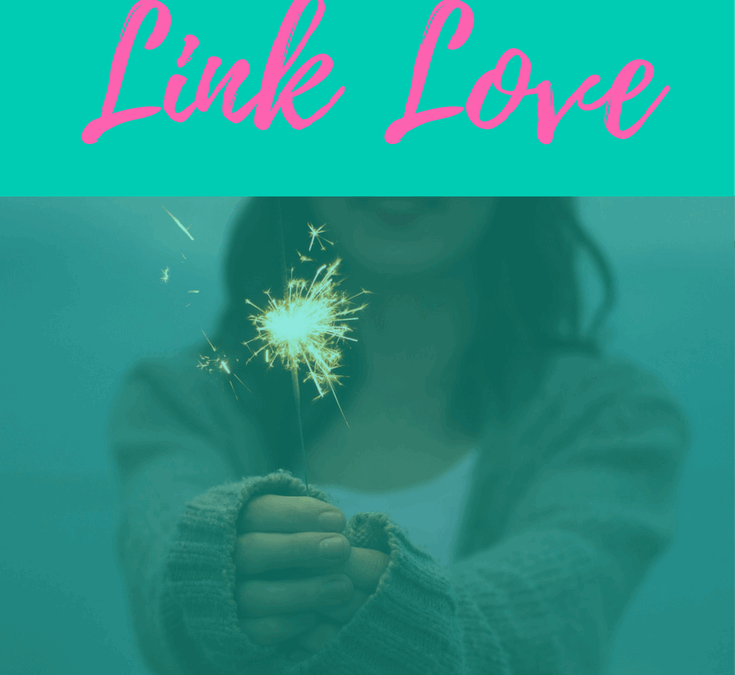
by Kasia | Oct 28, 2016 | Blogging, Freelancing, Writing
Happy Friday! I can’t believe it’s Friday already. I swear the end of the work week rolls around faster and faster each week as we draw closer to December.
Did you know it’s just over eight weeks till Christmas?
Yes, it catches me by surprise every year. Worse now that I’m older and a mum.

I’ve been feeling a bit blah about my writing and everything in life the past week. It’s been a busy busy one as usual and instead of keeping up with writing articles and publishing them Monday to Friday, I’ve been reading them.
And I haven’t done a Friday Link Love in a while.
So cheers to Friday and here’s a few interesting posts I’ve caught up on this week that you might love to add to your ‘to read’ list this week!
7 Powerful Lessons from Learning to Reject Your Limitations on Goins, Writer.
We all have limitations, some more extreme than others. I couldn’t stop reading this article. There’s so much we can all learn and realise that we are the ones who place the limitations on ourselves.
What 200 Rejections Taught Me About Being a Freelance Writer on The Write Life
Rejection is a fact of life at some point or another. It’s even more certain when you become a freelance writer.
Being Authentic Matters at Horkey Handbook
Authenticity is hard to find, especially on the Internet. Gina talks about the ups and downs of freelancing and business and her honesty is refreshing. We should all stay authentic to ourselves and maybe then we’d all be closer to living our dreams.
7 Steps to Writing Killer Blog Posts That Actually get Noticed – and Read! at Problogger
I’m in the process of starting a niche site (more on that later), so I’m reading and rereading lots of articles on Problogger. There’s some great pointers in this article about writing awesome blog posts. Time to start putting them into practice!
Make Money Blogging: Lessons From 10 Successful Bloggers at Money Can Buy Me Happiness
Some great tips and ideas for making money blogging from experienced bloggers at various levels. I have a weakness for personal finance websites. I love reading them and writing them (have had one I write anonymously on).
Have a great weekend!
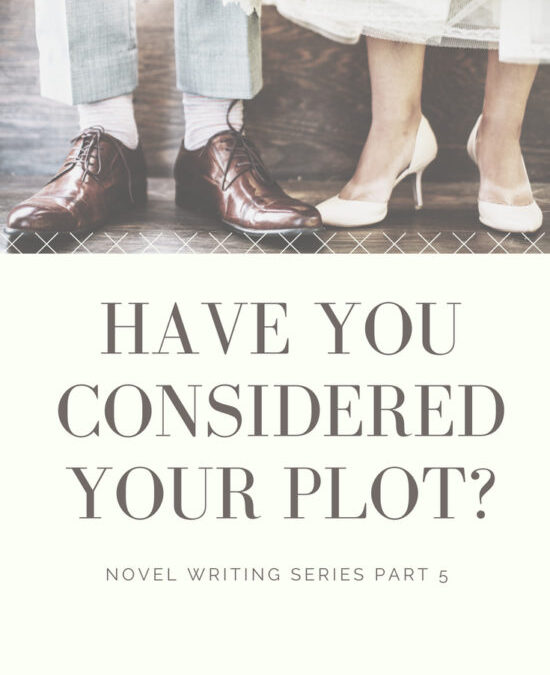
by Kasia | Oct 19, 2016 | Writing
Do you ever finish reading a book and go, ‘Wow, I wish I could come up with that plot?”
Yeah, me too.
The plot is integral to a good genre book. Literary novels have a plot too but they are often very character centred.
Genre novels, the books that his the New York Times and USA Today Best Seller lists are often plot driven. Mostly written by the likes of James Patterson, John Grisham, and Nicholas Sparks.
A good plot will make you keep reading until the last page. An awesome plot will have you talking about the book to friends long after you’ve reached ‘the end’.
As a storyteller of genre fiction, personally, I think any fiction, you need to consider your plot carefully. The plot needs to keep your readers interested until the very end and to fit in with your chosen characters.
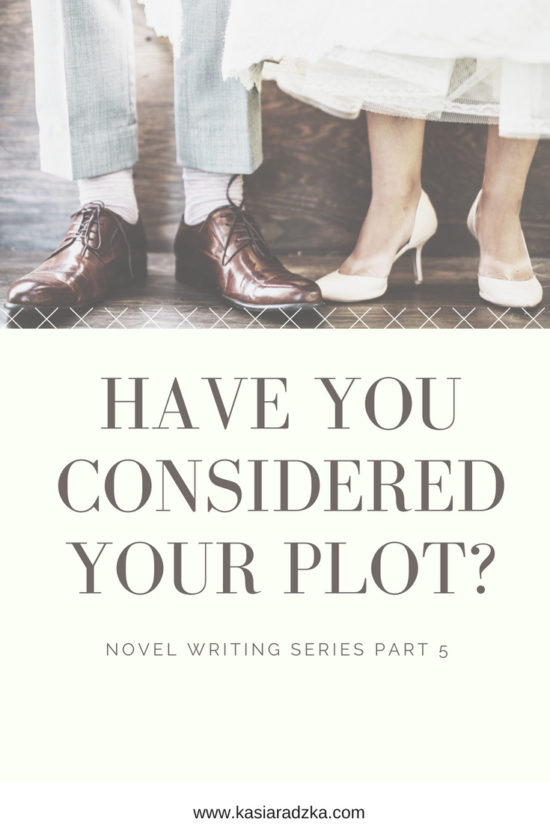
How do you create a winning plot for your book that will entertain readers and sell books by the millions?
Hmm, Russell Blake, Stephen King, Bella Andre among others have figured it out, and they are making a living doing what they love: Writing.
You can too.
What do these authors have in common?
- They write in genre fiction.
- They write in a specific category that they stick to and improving on their writing with each book.
- They tell good stories.
- They create high stakes.
- They are entertaining.
- Their stories keep you at the edge of your seat or up till dawn when you realise you have to get up for work within the hour.
But it’s so hard to find something original.
Remember: there are probably no more original plot ideas.
Most stories have been told time and time again. Your job is to take a used idea and make it original again by giving it your own slant.
Boy meets girl, they fall for each other, obstacles get in the way that prevent them from being together, finally, they find their way back to each other.
Sound familiar?
That’s because that’s pretty much every romance novel on the market. It’s a formula, it’s what readers expect. The devil is in the details. You can make the story your own by creating characters and settings that readers can fall in love with.
A crazed lunatic wants to destroy the world. Only one man or woman can stop him. Will she or he defuse the bomb in time and still get the girl/boy in the end?
Again, it’s been done a thousand times and it will get done a thousand more.
There are no original ideas.
There are original spins on ideas and new ways of telling them.
So don’t be worried that you’re regurgitating the same story. Ask yourself, why do you read books? What type of books do you read? What do you expect from the books you read?
I love crime thrillers. I expect a thrill ride. I expect the bad guys to cause trouble. I expect the good guys to stumble. I expect a satisfying ending where generally the bad guys lose. Pretty standard, right?
So what is a plot?
The plot answers the ‘why’ in a story.
* Why did Matti sell everything and move to the opposite side of the globe?
* Why did Rose decide to risk her life and be the first person to land on Mars?
* Why did Leo murder his neighbour?
* Why did Shelly the alcoholic join the nunnery?
Any of the above could be used to create a plausible plot.
* Matti sells everything and moves to the opposite side of the globe to escape her abusive husband.
* Rose decides to risk her life and be the first person to land on Mars to save the human race.
* Leo murders his neighbour to avenge the death of his dog.
* Shelly the alcoholic joins the nunnery to avoid going to prison.
E.M. Forster said the difference between a story is:
Story: The kind died and then the queen died.
Plot: The kind died and then the queen died because of grief.
Tightly written plots keep readers in suspense. Everything happens for a reason and is neatly tied together although you don’t always realise that till the very end.
Loose plots don’t always have a connection between the events that occur. That’s ok too as long as it makes sense to the story.
Open-ended plots finish the story without a distinct conclusion. That doesn’t make them any less satisfying than the closed structure where the plot comes to a satisfactory ending. Both are fine as long as they suit your story.
Don’t force one when the other will work better.
Creating a plot for your story may seem difficult in the beginning but it doesn’t have to be.
Come up with a character. Throw them in a difficult situation. Give them a good enough reason to get out of it/overcome it/achieve it. Then write your story.
Do you find plot creation easy? How do you come with plots for your books?
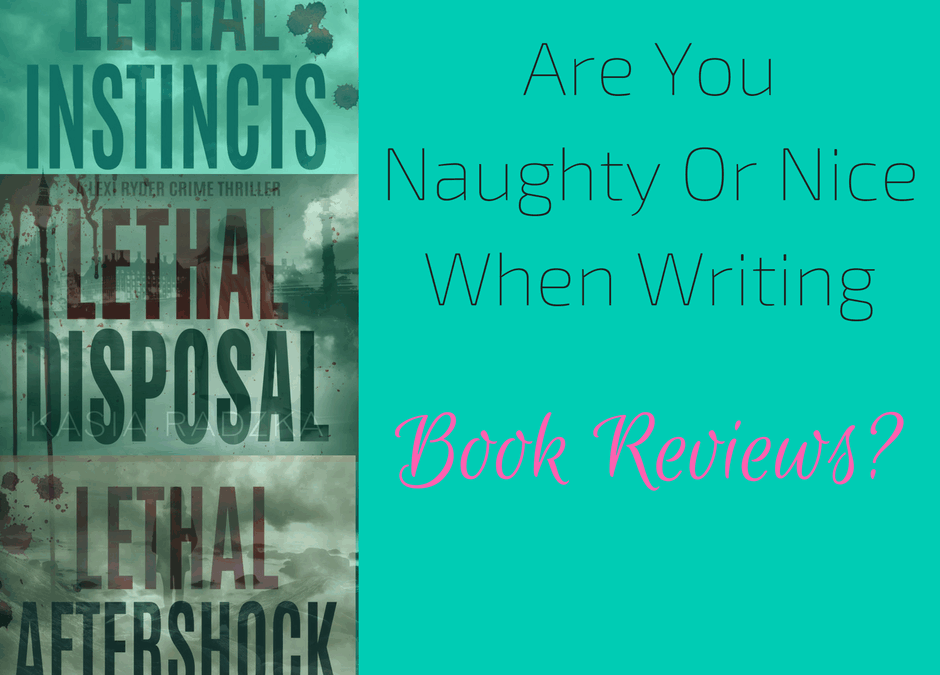
by Kasia | Oct 14, 2016 | Writing
Do you leave book reviews of your favourite books on Amazon or Goodreads?
I have a love and hate relationship with book reviews.
I enjoy reading them to get an idea of what people think of the same book that I just finished reading or a book that I plan to buy.
What surprises me the most is how nasty people become when they are reviewing books online vs in person.
It’s like all emotion, empathy and decency gets thrown out the window and anything goes when they’re sitting in front of a keyboard and screen.
It’s rude. It’s sad. It’s just plain nasty.
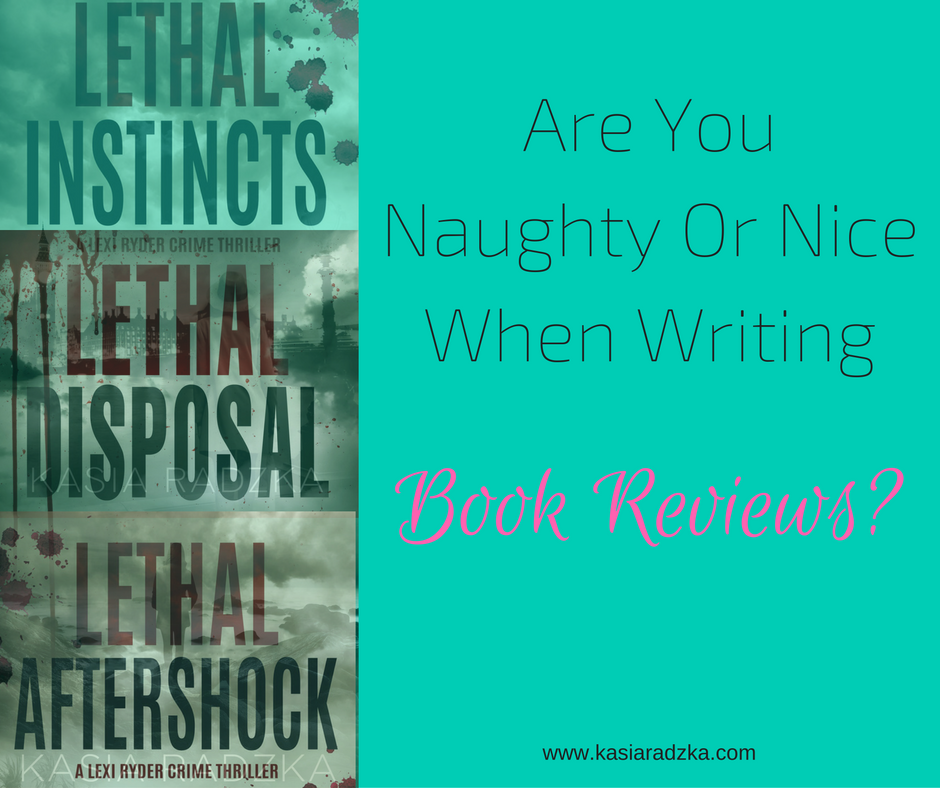
The Internet has brought the world a lot of good but it has also allowed people to bring out their claws. If they can’t see you, or they don’t know you, they feel that they can say anything they want.
What they don’t realise is there is another person at the other end.
Have you heard the saying that goes something like this, nine people will say awesome things about your book or product and then one will diss it, abuse it, and tell you you’re stupid. Who are you going to listen to?
Yep, the one little person who felt it was ok to kick in the guts and make you feel like shit.
I’m not saying we shouldn’t be honest in our reviews. Honesty is a dying trait. Be honest. But it doesn’t mean you have to be a pompous ass about it.
Reviews are awesome as it allows us to share our opinions with the rest of the world. And that’s fine. That open communication is great to engage within your community and the world.
It’s an opportunity to converse and debate with people from around the globe on similar interests. It’s a great way to make online friends and build platforms.
If you’ve written a book or sold a product or even write a regular blog you are going to get reviews of some form. For a book it might be on Amazon, Goodreads or a review blog. A blog or product might get reviews on a review page, Amazon or in the comments section of your blog.
Sooner or later you’re going to get hit with a nasty comment.
Have you had one before?
I have.
It felt like a kick in the guts. I couldn’t breathe. My stomach hurt. I wanted to throw up. I wanted to curl up in a tiny ball and hide in a dark room for eternity.
I didn’t bother listening to the comments that sang praise.
Stupid right?
Yes and no.
Both good and bad reviews have their place. But there is a difference between constructive criticism and plain-old nasty.
Which one do you sway towards?
Some people take pleasure in making others feel like shit.
Do you know what I’ve noticed about them?
Often these are the people who are not happy with their own lives, jobs, partners, friends, relationships, weekends.
So they take it out on others.
But you don’t have to be one of them. Nor do you have to listen to them.
As a reader and a writer you might feel inclined to leave a review to voice your opinion. If it’s an angry one give yourself a moment to assess your thoughts and ask yourself why the book or product makes you feel that way.
Cool down and think twice before hitting publish. There is an actual living, breathing, lovely person sitting on the other end.
Until I published my first book I didn’t really bother with reviews. I figured others could leave them, they didn’t need my opinion added to the mix.
But leaving reviews is good. It’s supportive of the writers or products you love (and sometimes don’t).
When there are mixed reviews it gives the next person contemplating buying the product to get a balanced perspective and make up their mind about the stated pros and cons. It helps them make a more informed decision.
I read a lot. I try to get through one to two books per week. Some of these are recorded on Goodreads if you want to check out what I’ve been reading lately.
I’ve even left reviews. With one caveat.
I will only leave a review if I think the book is at least 3 stars. I don’t want to leave bad reviews or dishonest ones. So If I don’t review a book it’s usually because I don’t rate it high enough.
Sometimes though if I’m not familiar with a genre and the rules of that genre I will not leave a review unless I really loved the story. I don’t think it’s fair to the writer.
What do I look for in books?
Engaging plot
Easy to read writing
Interesting characters
Good dialogue
More action less description
Spelling & Grammar
Have you noticed I haven’t mentioned grammar and spelling? While these are important, they are the last thing I consider when leaving a review.
I had a kind enough person email me once telling me they liked my story and saw potential in my writing but would not leave a review because they found too many spelling and grammar mistakes in the book.
That’s fair enough. I’m grateful for their honesty and decency although my first reaction was not so – I took a moment and tried to take emotion out of the equation – hard but not impossible.
After that, I went through a hard copy of my book with a red pen and fixed everything up. I also changed editors.
Genre
Certain genres have certain rules.
Crime books for example general end up finishing with the bad guy in handcuffs or something equivalent.
Romance novels most often than not have a happy ending where the hero and heroine end up together (after many obstacles) and live happily ever after.
Yet reviewers still can’t help themselves and say ‘That was so (*&^ing predictable.’
Yes it was. Romance readers want a happy ending and they want the two main characters to snog at the end just as crime readers want to make sure the good guys always win.
Some books break the rules, often these are cross genre ones. But you have to know the rules to break them and understand the different genres.
Should you leave book reviews?
Yes. Yes. Yes.
But be nice. You’re reviewing a persons work. Sometimes it’s the most important thing to them. Something they’ve worked all their lives towards and has taken a lot of courage to put out in the world.
Their first book might not be the best, yours probably wasn’t or won’t be either. But with enough encouraging reviews they might keep going, keep improving and then one day on their seventh (think Hugh Howey’s Wool) or twelfth book they might hit the right spot and sell a gazillion copies.
Think of your favourite authors. Have you read some of their initial work?
We all have something to learn. We can use reviews to improve our writing and our reading.
Just remember, that your review is just your opinion. There are over seven billion others that could be different from your own.
If you see a ton of mistakes in a book but enjoyed the story why not write an email to the author and explain to them that the book was good but because of the errors you aren’t inclined to leave a review. That’s fine. At least they are aware of the problem and the ball is in their court to fix it.
What really frustrates me is when a reviewer will find three spelling mistakes in a 100,000 word novel and give a bad review. Or they think that an urban fantasy genre is unrealistic. Hmm, vampires, werewolves and faeries are the creations of our imaginations, they aren’t meant to be realistic.
If you’re a reader, think twice before leaving a bad review. People read them. They get hurt by them. Sometimes they give up because of them.
If you’re a writer, don’t take all the reviews to heart but do read them with an open mind. A few might be telling you something. Use reviews to improve your books and to grow as a writer. You want each book to be better than the one before it, don’t you?
Leave a review. It’s one of the ways you can support authors and encourage better writing.
Do you leave book reviews? Have you received one that made you want to give up?
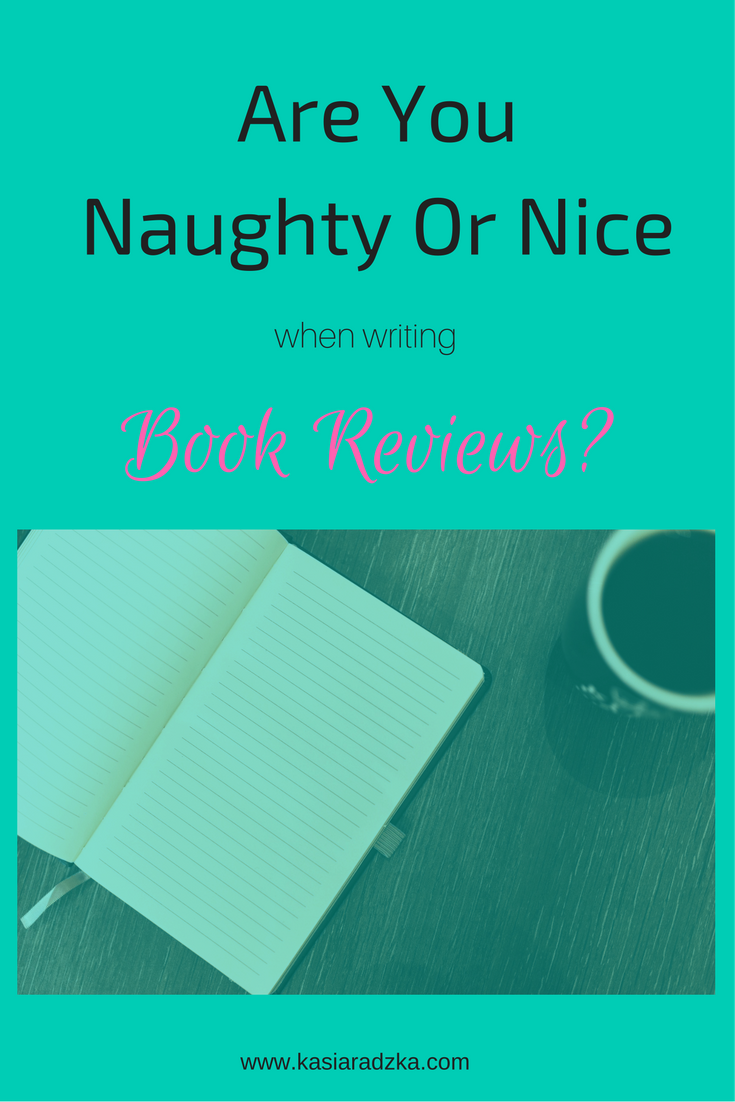
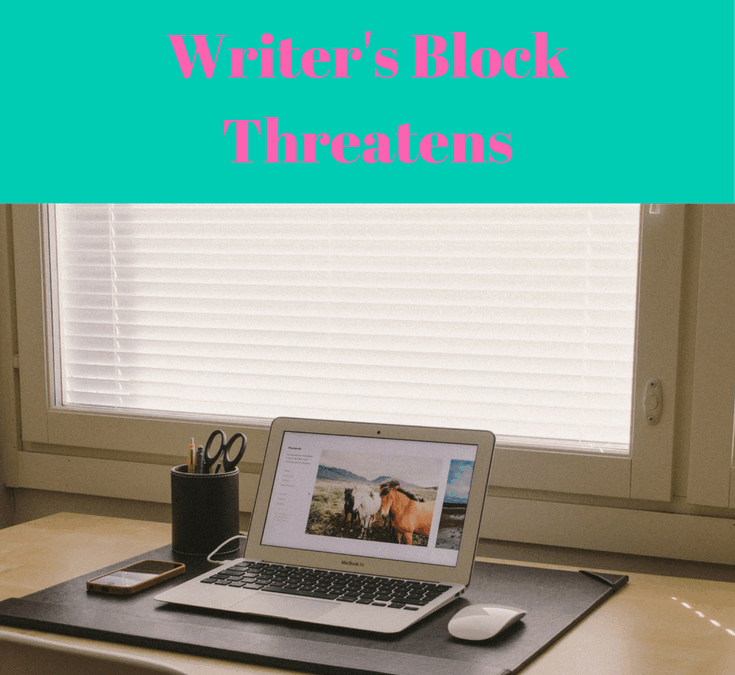
by Kasia | Oct 11, 2016 | Writing
Writer’s block. I don’t believe it. The only time writer’s block hits is;
1 – When your story isn’t working
2 – Not enough knowledge/research about a subject
3 – Writing without an outline/plan
4 – Lost interest
One of the most important tools and talents of a writer is the the never-ending well of ideas that rests on their shoulders, or hides inside their brain. Writers are strange people, they like to watch and use their observations in their stories, they are curious about people’s behaviours, choices and attitudes. They often stare into space or read a book for hours and call it working.
Working it is. That is one of the joys of being a writer.
Unfortunately, your significant other might not understand this at all.
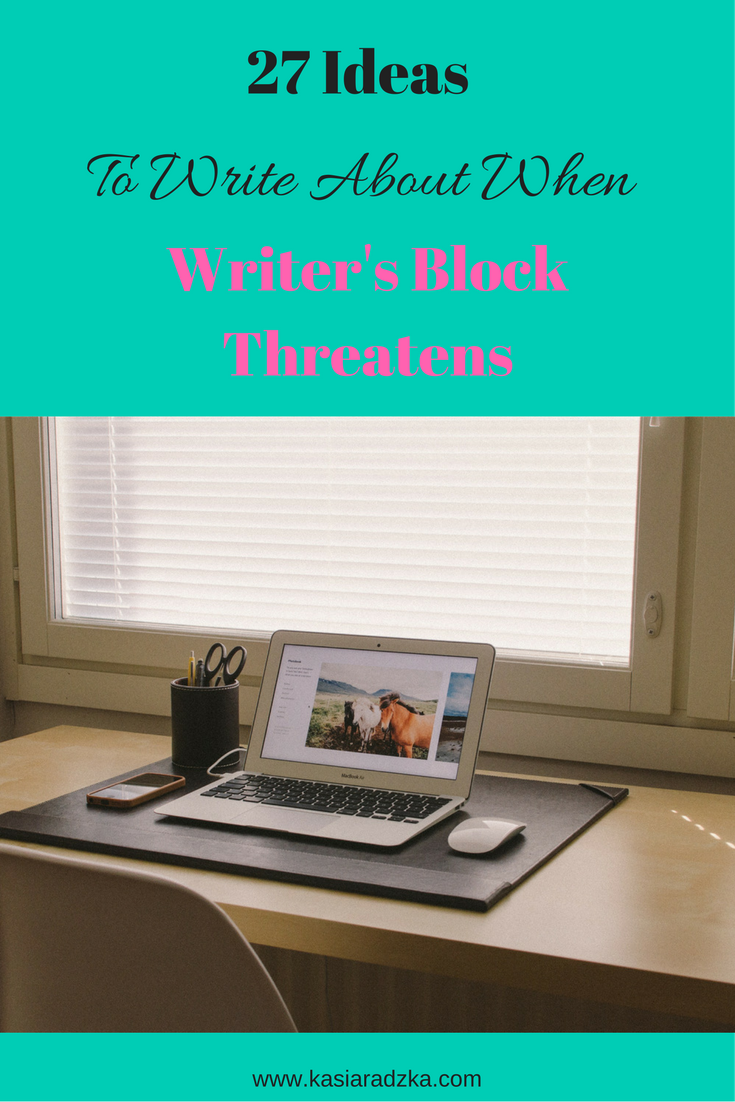
If you’re feeling stuck, here are a few ideas to get your going again.
Do you need an idea for a short story or a novel?
Play the ‘what if’ game.
1. What if you discovered that your neighbour was an assassin for hire?
2. What if your dog started talking to you?
3. What if you woke up to find yourself in the middle of a war zone?
4. What if you decided to pack just a suitcase and move to Morocco?
5. What if you came home to find a goodbye note?
6. What if you left leaving just a goodbye note?
7. What if the people on the train were zombies?
8. What if you won the lottery and gave it away the next day?
9. What if you won the lottery and went on a crazy spending spree?
10. What if you couldn’t read or write but had to finish school?
11. What if you witnessed a crime in a dark alley?
12. What if your mum was a mob boss?
13. What if scientists discovered a cure for all diseases and refused to let it out in the open?
14. What if the government made a law against people owning cameras?
15. What if the military took control of your city?
You can play the what if game with just about anything to get your mind stirring. Pick any idea or work your way through the list and see what or if any story emerges. Combine ideas for more compelling and interesting stories. See what works, see what doesn’t.
What ‘what ifs’ can you come up with? I find this exercise great to do whilst reading the newspaper or watching a movie. Ideas are triggered by scenes, dialogue and situations I encounter throughout the day. That’s why it’s important for writers to always have something to scribble on when that idea pops to mind. Funnily enough, many of my ideas pop up in the middle of the work day when I should be concentrating on numbers rather than story telling!
Write a short story using the following elements:
1. A butler, a monkey, a basement and loss.
2. A priest, a dog, a casino, and love.
3. A soldier, a unicorn, a car and honesty.
4. A teacher, an elephant, a train and gratitude.
5. A homeless person, a gold fish, a school and passion.
6. A cop, a baby, a theatre, and faith.
These are just meant to get you thinking. Sometimes you might get a full story out of them, other times just a kernel to get you going with your own writing. Stretch your writing muscles and your imagination will always be on your side, the muse will show up and you won’t have enough time to get all the ideas on paper.
That’s great for when you’re writing fiction but what about non-fiction like blog posts and articles?

There are ways to never run out of ideas, here’s just a few:
1. Grab a magazine and check out the headlines. Can you twist them around?
Write with the opposite point of view.
- Turn 5 Foods That Will Blast Off The Fat to 5 Foods That Will Make You Fat.
- How To Get More Sleep Each Night to How To Function With Only 5 Hours of Sleep Per Night
- Why You Should Run That Marathon To Why Running A Marathon Is A Bad Idea
2. How about slanting one story idea for different audiences?
If you’re writing about a top on productivity you could write several articles aimed at a different audience. Of course you don’t want to plagiarise yourself. You can use similar research but the article itself needs to be original. You’re simply repurposing the idea for multiple markets. Less work whilst increasing your bottom line.
3. What do you really terrible at?
Start making a list. Be honest with yourself. There’s bound to be two or three things you’re not very good at.
So you hate investing. Is there a way you could change that around by learning about it and writing articles or blog posts about your journey to investing zen?
- Investing 101: What the hell does investing mean anyway?
- How to save money when you’re broke
- Shares: Why I Want To/Never Want To Invest In Them
4. What about the things you would love to learn?
One of the awesome things about being a writer is the constant self-education. You don’t have to write what you know, instead write what you don’t know to expand your knowledge and fill up your creative well.
Have you a passion for food?
Chat up a chef or waiter and see if they are willing to dish the dirt on restaurants and food in the area. Can they explain to you the different between julienning and cutting? Maybe share a secret ingredient that adds spice to any meal? What do they predict to be the up-and-coming meal/fruit/dessert?
5. Where’s your bucket list?
Do you have a bucket list? These days many people do and they flaunt it all over the place. If you don’t, now’s a good time to start making one. Once you’ve got it down on paper, is there anything that you could get started on now? Great, get going and then write about your experience.
6. What’s your qualification/day job?
If you studied or are studying, worked or are working, you have something to write about.
Focus on your knowledge areas. Just because you know the difference between calories and kilojoules or HTML and CSS code doesn’t mean every one else does. There’s ample opportunity to write on topics from horses to dental care and beyond.
How many article ideas can you come up with based on your day job or qualification?
Writer’s block doesn’t have to be a curse. It’s usually just a sign that something isn’t working. Here are just a few other things you can do:
- Take a step back and reassess your work.
- Ask yourself what you want your story to say.
- Write without censoring yourself.
- Forget perfection, just get it written.
Do you ever suffer from writer’s block? How do you overcome it?












